Grading, price, raw beans and roasting of washed bourbon coffee beans No. 1 in San Juan, Honduras

Professional barista communication, please pay attention to coffee workshop (Weixin Official Accounts cafe_style )
Breed: Bourbon
Processor: COMISAJUL Cooperative
San Juan Cido is a small village in central Honduras, 40 km northeast of Tegucigalpa, Honduras. Francisco Morazán also has jurisdiction over Nuevo Rosario, Guacamaya and Plan Grande, with a total population of approximately 1400.
Although San Juan Cido was historically known for its mineral deposits, its importance today is highlighted by its location within the buffer zone of La Tigra National Park, a rainforest ecosystem and Honduras 'first national park. The park acts as a huge reservoir of water, providing water for the capital's half a million inhabitants.
Flavor: Clean, toasted nuts, milk chocolate
In Honduras, coffee production is divided into six regions, located in the west and south: Santa Barbara, El Paraiso, Copan, La Paz, Comayagua and Olancho, with an average planting height of more than 1100 meters. Coffee varieties are Arabica, 69% belong to HG "high coffee" grade, 12% belong to SHG "special highland coffee", 19% belong to CS. The main varieties are Typic, Bourbon, Caturra, Villa Sarch and Lempira.
Bourbon coffee (French: Café Bourbon) is a coffee produced from the coffee tree cultivated for Arabica coffee bourbon. Bourbon coffee was originally grown in Réunion, also known as Isle Bourbon until 1789. Later occupied by France to connect it to Africa and Latin America, it is now one of the two most popular Arabica coffee producers in the world, with bourbon usually produced at altitudes of 3500 to 6500 feet (1062 - 1972 m).
Hand-washed Honduras. 15g powder, medium grinding (small Fuji ghost tooth knife 4 grinding), v60 filter cup, 88-89 degrees water temperature, the first injection of 30g water volume, 27 seconds of stewing, injection to 105g water volume cut off water, wait for the powder bed water volume to drop to half, then inject water slowly until 225g water volume, tail section do not, water powder ratio 1:15, extraction time 2:00
Factory Name: Qianjie Cafe Address: No. 10 Baoan Qianjie, Yuexiu District, Guangzhou City Contact: 020-38364473 Ingredients List: Self-baked Shelf Life: 30 Net Content: 227g Packaging: Bulk Taste: Aromatic Coffee Bean Ripe Degree: Coffee Ripe Bean Sugar: Sugar-Free Origin: Honduras Coffee Type: Other Roasting Degree: Moderate Roasting
Honduras San Juancito Lot#1
Country: Honduras
Origin: San Juan Cido
Altitude: 1450-1550 m
Treatment method: washing
Because Honduras is located in the tropics, San Juan likes to have less temperature variation throughout the year. Therefore, the so-called winter is actually the rainy season, and the so-called summer is actually the dry season. In the tropics, altitude has a greater effect on temperature than the length of precipitation in the year. San Juan Cito's geographical location is above 1239 meters above sea level, making the temperature slightly cooler throughout the year. In summer (March-June), the highest temperatures tend to be 26 ° C. C, and the lowest temperature is about 18? C。The average temperature in winter is 20. C, the lowest is about 14. C.
San Juan Cito's modern economy is largely dependent on agriculture, much of it small-scale coffee production, and its climate and altitude are very conducive to producing high-quality coffee beans. COMISAJUL, a cooperative of hundreds of small coffee farmers in central Honduras, is located in San Juan Cito. COMISAJUL is a cooperative of hundreds of coffee farmers in San Juan Cido, where coffee is grown at an altitude of 1450-1550 meters and shaded by banana, avocado, papaya and other fruit trees. Coffee farmers hand-pick ripe fruit during harvest season, wash it and then dry it in the sun. The fermented water produced by washing with coffee peel pulp is collected and used as fertilizer for coffee trees. This batch of coffee tastes very clean, sweet, very mild acidity, with milk chocolate flavor.
Important Notice :
前街咖啡 FrontStreet Coffee has moved to new addredd:
FrontStreet Coffee Address: 315,Donghua East Road,GuangZhou
Tel:020 38364473
- Prev

Variety, Brand recommendation and Manor of washed bourbon Coffee beans No. 1 in San Juan, Honduras
For the exchange of professional baristas, please follow the coffee workshop (Wechat official account cafe_style) in Honduras, coffee producing areas are divided into six major producing areas, spread over the west and south, namely Santa Barbara (Santa Barbara), Perry request (El Paraiso), Coban District (Copan), Bazi District (La Paz) and Gongmayagua District (Comayagua) and Olanqiu District (Olancho).
- Next

San Juan Cido No. 1 Ground Washed Bourbon Coffee Bean Flavor Characteristics, Producing Area and Brewing Ginseng
Professional barista communication, please pay attention to coffee workshop (Weixin Official Accounts cafe_style ) Processing method: washing because Honduras is located in the tropical region, San Juan likes more temperature changes throughout the year
Related
- Detailed explanation of Jadeite planting Land in Panamanian Jadeite Manor introduction to the grading system of Jadeite competitive bidding, Red bid, Green bid and Rose Summer
- Story of Coffee planting in Brenka region of Costa Rica Stonehenge Manor anaerobic heavy honey treatment of flavor mouth
- What's on the barrel of Blue Mountain Coffee beans?
- Can American coffee also pull flowers? How to use hot American style to pull out a good-looking pattern?
- Can you make a cold extract with coffee beans? What is the right proportion for cold-extracted coffee formula?
- Indonesian PWN Gold Mandrine Coffee Origin Features Flavor How to Chong? Mandolin coffee is American.
- A brief introduction to the flavor characteristics of Brazilian yellow bourbon coffee beans
- What is the effect of different water quality on the flavor of cold-extracted coffee? What kind of water is best for brewing coffee?
- Why do you think of Rose Summer whenever you mention Panamanian coffee?
- Introduction to the characteristics of authentic blue mountain coffee bean producing areas? What is the CIB Coffee Authority in Jamaica?

